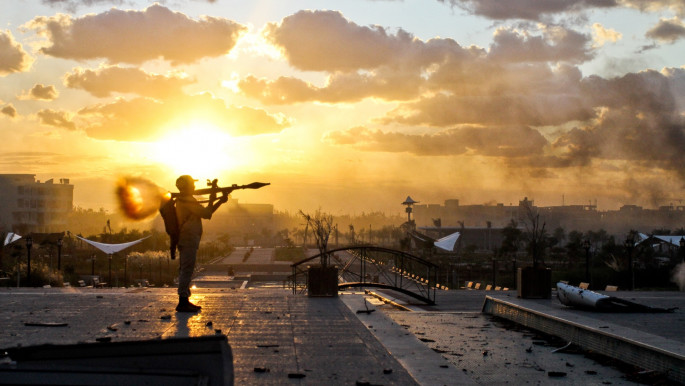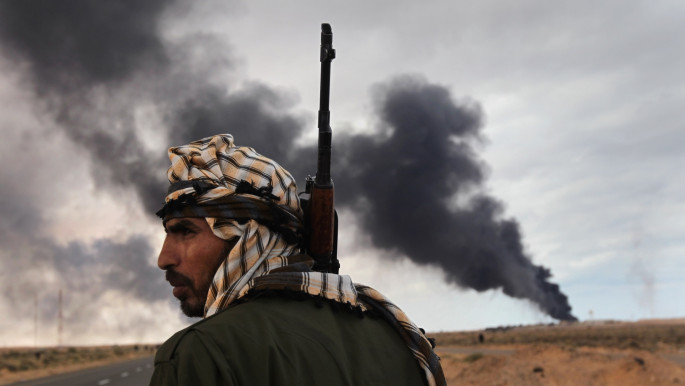What does Fayez al-Sarraj's resignation mean for Libya?
Libya's conflict has seen significant changes over the past several weeks following the resignation of the prime minister of the UN-recognised Government of National Accord (GNA) Fayez al-Sarraj, a cabinet reshuffle, and growing societal unrest.
"I announce to everyone my sincere desire to hand over my duties to the next executive authority, no later than the end of next October," he declared in a televised speech from the capital, Tripoli, last week.
He said he hopes that the Libyan Dialogue Committee "will have completed its work by then, selected a new presidential council and chosen a head of government to whom to hand over the duties, according to the outcomes of the Berlin Conference that were approved by the UN Security Council."
He also cited "internal and external conspiracies" and other obstacles to the effectiveness of his government.
This came after a cabinet reshuffle in the GNA and the House of Representatives (HoR), its rival government in Tobruk, eastern Libya, in response to recent protests across the country, in both administrations' areas.
Growing domestic tensions
Large demonstrations erupted throughout August, demanding better living conditions, opposing corruption, and protesting water, fuel and electricity shortages. Sarraj also dismissed the GNA's Interior Minister Fathi Bashaga in August over claims that he supported the protesters. Other changes occurred, including the appointment of Salah Eddine al-Namrush as defence minister.
 |
Libya's conflict has seen significant changes over the past several weeks following Sarraj's resignation, a cabinet reshuffle, and growing societal unrest |  |
There is already speculation over who could replace Sarraj. One figure to keep an eye on is Ahmed Maiteeq, the GNA's deputy prime minister. Meanwhile Abdullah al-Thani, prime minister of the HoR, submitted his resignation on 14 September, in response to protests occurring in Benghazi and other eastern cities.
The GNA and Tobruk-based House of Representatives (HoR) previously declared a ceasefire in August and the start of a new political process, pledging elections in March 2021. This delivered another blow to Khalifa Haftar's self-proclaimed Libyan National Army (LNA), as it positioned the HoR parliamentary speaker Aguilah Saleh as a candidate to replace Haftar as the figurehead of an eastern government.
 |
|
| Read more: Libya ceasefire: Window of opportunity or doomed to fail? |
While Haftar's forces allegedly violated the ceasefire in early September, it has so far held, raising hopes that a lasting peace plan could be driven forward. There are some suggestions that international pressure worked to achieve Sarraj's resignation, and that the unpopularity of his rule had led to this outcome.
Oliver Oscwa, Germany's Ambassador to Libya, tweeted on 17 September that "President Sarraj's decision deserves respect! As transition of power is a challenge to any country."
The UN Support Mission in Libya (UNSMIL) also commended Sarraj's decision, stating "the President's announcement comes at a decisive turning point in Libya's longstanding crisis when it is clear that the situation is no longer sustainable."
"It is crucial that the international community fulfils its responsibilities as well, to respect Libyan sovereignty, to cease interference in Libya's internal affairs, and to fully respect the UN arms embargo," the statement added.
Libya has endured instability and worsening living conditions since descending into chaos following the overthrow of Muammar Gaddafi in 2011, and Haftar's repeated military campaigns have prevented a peaceful transition that could stabilise Libya.
 |
Large demonstrations erupted throughout August, demanding better living conditions, opposing corruption, and protesting water, fuel and electricity shortages |  |
Moreover, Haftar's blockade on the country's oil facilities, which he imposed in January to pressure the GNA, has worsened Libyans' livelihoods, as oil is the main source of Libya's income. Though he announced the lifting of it on 18 September, it has resulted in around $9.8 billion in lost revenue according to National Petroleum Company (NOC). This has played a significant role in the country's worsening living conditions.
How Turkey's role will be impacted
With these latest changes, various countries involved in Libya will be watching the developments closely. A key actor is Turkey, which has been instrumental in supporting the GNA against Haftar's forces.
Turkish President Recep Tayyip Erdogan expressed sadness after the result of Sarraj announcing his resignation. "A development like this, hearing such news, has been upsetting for us," Erdogan told reporters in Istanbul.
 |
|
| Read more: France and Turkey's growing rivalry in the Middle East |
Some analysts have suggested that this means that Turkey's influence in the country could be threatened. Ankara initially increased its influence in Libya following the Memorandum of Understanding (MoU) brokered with Sarraj in November 2019, which granted Turkey greater access to oil off Tripoli's shores, amid its more assertive stance in the Eastern Mediterranean.
However, Turkey still has considerable leverage over the GNA, which its military backing had helped consolidate. The new defence minister al-Namrush announced on Sunday that Turkey agreed to help reconstruct the GNA's military in western Libya and make it into a more advanced army, providing training and logistical assistance.
Ibrahim Kalin, Recep Tayyip Erdogan's spokesperson, also said on Monday "These accords will not be impacted by this political period because these are decisions made by the government, not by any individual," adding that Ankara will keep supporting the GNA regardless of Sarraj's resignation.
 |
The wider international community must rein in efforts to sabotage the country's political transition |  |
While bolstering the GNA, Turkey is meanwhile still in communication with Russia, both likely to take a lead in Libya's negotiations. Turkey is now also in a stronger position to negotiate with Egypt, potentially defusing both countries' tensions as Cairo previously sided with the UAE in backing Haftar.
Can domestic pressure create a fairer solution?
Meanwhile, the United Arab Emirates, which has heavily backed Haftar, could still look to spoil the latest initiatives.
 |
|
| Read more: Divided Europe: How the West lost influence in Libya's war |
As Tarek Megerisi wrote for the European Council of Foreign Relations: "The UAE's primary interest in Libya is to see Turkey pushed out of the country, whereas this entente will do nothing to prevent Turkey's continuing commercial, political, and military entrenchment in western Libya."
"Direct pressure on Haftar and the Emirates to not spoil proceedings will be crucial, and this should include threats of sanctions against Haftar's economic activities," added Megerisi.
Any steps taken after Sarraj's resignation should therefore consider the people's interests first. These protests reflect the widespread damage that has been done as a result of Libya's instability.
Moroccan Foreign Minister Nasser Bourita said during the recent peace talks on 6 September that negotiations must be decided by the Libyans themselves, while adding "Morocco has no agenda or initiative to submit."
The wider international community should adopt such an attitude to ensure that Libya's diplomatic efforts succeed. This would also require reining in efforts to sabotage the country's political transition, which could otherwise jeopardise the protests having any positive impact. Pushing Haftar to permanently lift the oil blockade is also a necessary step.
Follow him on Twitter: @jfentonharvey





 Follow the Middle East's top stories in English at The New Arab on Google News
Follow the Middle East's top stories in English at The New Arab on Google News


